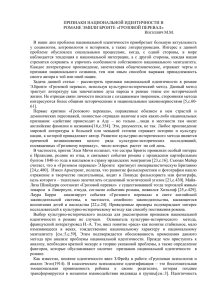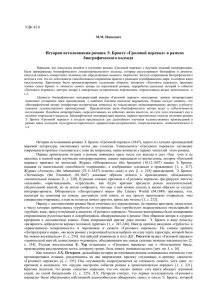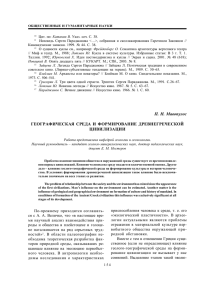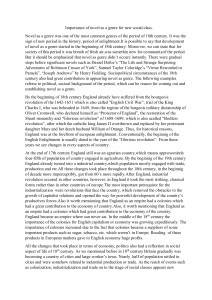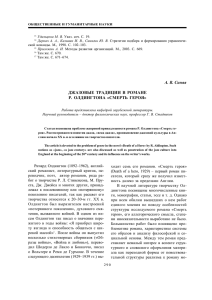Жанровая «ловушка» в романе Э. Бронте «Грозовой перевал»
реклама
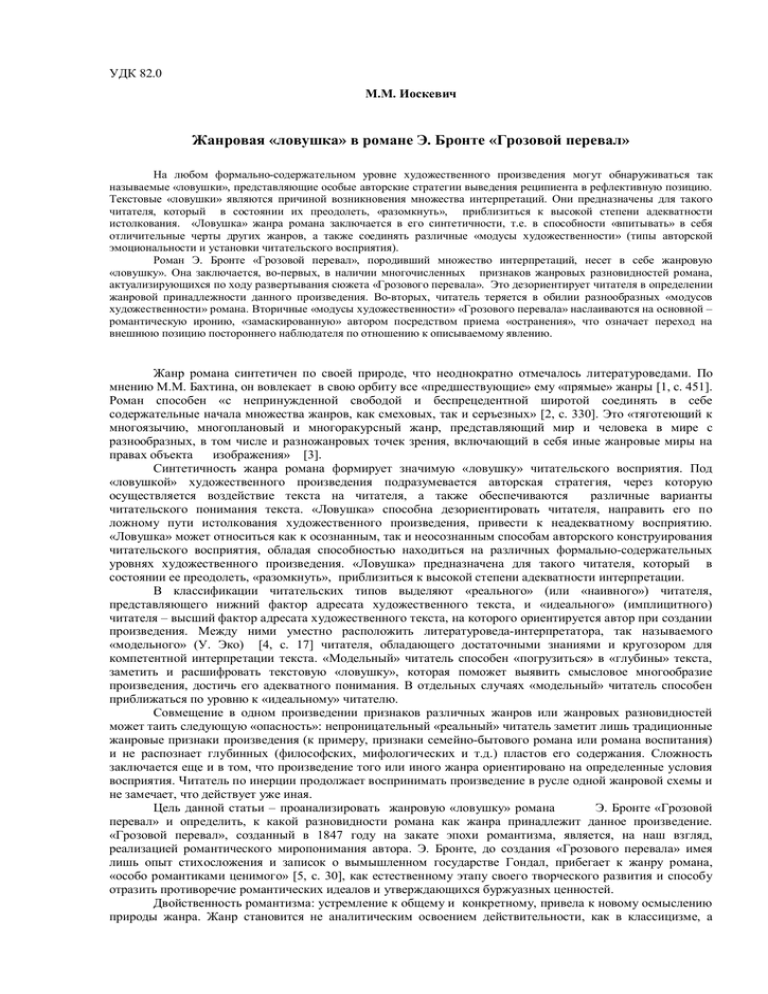
82.0 . « « » . « » », « . » . , , « . « », » , , . « » ( « » ). . « , ». », , , , « ». . » . , « , « « »« » » », « – . , . , « » « . [1, . 451]. » « , , , » [2, . 330]. « , , , » [3]. « » . » , , . « » , , » . , , . « ,« » , », . « – » ( , « « ») , ) » ( , . » ( . , ) [4, . 17] , .« » », . . « , « » « « « »: « ( » « » , » » , ( ) , .) . , . , . – » « » . « , », 1847 , . . , . , , « » , , » [5, . 30], . : . , , , 2 [ .: 6]. XIX , XVIII , . , . « : « », , » [ .: 6]. » [7, c. 25]. « XVIII – , « », , , . « » . « » , . », . [8] . , . . , . , ( . , , [11], , . [10] » [18], . . [13], « » – . [14], [19]) « . », , « . . [16], . , [20] . » , « . » » , , . . , ». , , , , ( ) ). [17], , . « « [15], » « . , , , [12]) , ( . . . « . , , : [9], , ( —« »( « ( ), », « , », « ). » , , . . , [ ( .: 21, . 51 – 52]). . « » », « « . – 1500, ,« » [22, . 42]. , , « » »: », « ». » : , . , , . , , . , – , . , , , . , . », « « , » [23, c. 143]). ,« » [24, . 22]. , . « « , ), »( (« , , » »: « , » [22, c. 55]. . , :« , » [22, c. 61]. , , , , . 3 : « » . « » , . , – , , . , , , . , , « », . . , . , »– . , , , »[ . . « »– « » – : 22, . 123]. « » , , , . . ( ) – , . , , , . , : , , . , , , , . , . , « . , , , » , , , . , , , . » [25, . 285]. ( , », , . , « . ), , . , , . : , . , , . . – . , , . . « »: , , , . , . , , . – . , , , . , , , . – , , , . : , , . – , , , . « . » 4 , , « » « , , ». [26]. « , », : , , , . , , , , »: , , . , , » . , : . « – », , » , . « » « ». : , , ( . , , ) , « » , : » . « , . , , . , , , , . , , , , . « « » »: , ( .), , , . , , . « », ? , , « , » . , . – . , , , « . , , . [28], . . » [27, . 117], [13], «novel», [29], . «romance». . – « » – ( ), ) : . - « », « », , , « , , » [27, . 59]. , , , « » [27, . 59]. . », , . , . « , ( « : , . », .), « , , « : « « » , . » , , », » » , ( , . [30], . . [31]). 5 « » « », , « ». « »( . .« , , , , » ( . [13]), , , . , ) ( ( , . [32]) [2])), ( . [33]). , « » » « . , . [34] , , , . [36], . ». [35]: . . « , , « : [37] » – , ( . » [40], . ) [38]. . . , « » , . [39]. : . , XIX , , . « », »« « , .) » ( – « » [41, . 5]. , , , , « . , – ( . ). ( ) . , « » , , [41, , . . 21]. », « » » « » . », , , , , . , , « » . « » « » (« . « » , » [42, . 174]), , . « » , . , , . « , » : « , , ( – . , ( – ( » , …» [24, . 156]. . .) , ): . , . . .) ( « ?), , » , . , , 6 : .) , « ( – » [24, . 69]. . , , : . , , . , . , , , . . , . , , :« ( – .) » [24, . 8]. , , . : . , « » – : – « » , , . , . « « », , « . « » , . , , , » » « » « ». , , « « ». « », - » , . « », « » « » , . » . « , « ». , , . At any formal - substantial level of a literary work so-called «traps» can be found out, representing special author's strategy of deducing of the recipient in a reflective position. Textual «traps» are the reason of occurrence of many interpretations. They are intended for such reader who is able to overcome and open them, coming nearer to a high degree of adequacy of interpretation. The «trap» of a genre of the novel consists of its synthetic character, i.e. of its ability "to absorb" distinctive features of other genres, and also to connect various «modi of high artistic value» (types of author's emotionality and installations of reader's perception). E. Bronte's romance «Wuthering Heights», having generated a great number of interpretations, bears a «trap» of genre. First, it consists of numerous attributes of genre varieties of the novel, becoming actual on a course of expansion of «Wuthering Heights’s» plot. It disorients the reader in definition of a genre belonging to the given literary work. Second, the reader is lost in an abundance of various «modi of high artistic value» of the romance. Secondary «modi of high artistic value» of «Wuthering Heights» accumulate on the basic one - the romantic irony, «disguised» by the author by means of reception of «distancing» that means transition to an external position of the extraneous observer in relation to the described phenomenon. 1. 2. 3. , . . , , / : . . ./ . . .– .– .: . .: . . , 1975. – 502 . ., 1999. – 398 . / ]. – . // « Small Bay» [ : http// www.smallbay.ru/interest04.html. – : 23.03.08. 4. , . . / . – .: , 2005. – 507 . 5. , . : / . . – .: , 2004. – 368 . 6. , . / . [ ]. – : http:// www.kogni.narod.ru/rommorph.htm. – : 03.04.04. 7. XIX : . . – .: , 1982. – 320 . 8. Armstrong, N. Emily Bronte In and Out of Her Time / N. Armstrong // Genre. – No. 15. – 1982. – P. 243 – 264. 9. Pykett, L. Gender and Genre in Wuthering Heights: Gothic Plot and Domestic Fiction / L. Pykett. – London: Macmillan, 1989. – P. 71 – 85. 10. Homans, M. Dreaming of Children: Literalization in Jane Eyre and Wuthering Heights / M. Homans // The Female Gothic. – Montreal: Eden, 1983. – P. 257 – 279. 7 11. Van Gent, D. On Wuthering Heights / D. Van Gent // Modern Critical Interpretations. Emily Bronte’s Wuthering Heights; edited by H. Bloom. – New York, 1987. – P. 9 – 27. 12. Dawson, T. The Struggle for Deliverance from the Father: The Structural Principal of Wuthering Heights / T. Dawson // Modern Language Review. – 1984. – P. 289 – 304. 13.Frye, N. Anatomy of Criticism / N. Frye. – Prinseton, 1967. – 383 p. 14. , . / . . – ., 1960. – . 120 – 124. 15. , . , 1966. – . 160 – 179. :« »/ . // .– .: 16. Eagleton, T. Myth of Power: A Marxist Study of the Brontes / T. Eagleton // E. Bronte. Wuthering Heights. Case Studies in Contemporary Criticism; edited by Linda H. Peterson. – Yale University, 2003. – P. 394 – 410. 17. Wilson, D. Emily Bronte: First of the Moderns / D. Wilson // Modern Quarterly Miscellany. – No. 1. – 1947. – P. 94 – 115. 18. , . . « »/ . // . . . . . . . . – 1969. – 324. – . 252 – 283. 19. , . / . // . : ; . – ., 1990. – . 5 – 18. 20. , . / . // : . . .: 2 . / . . . .– : , 2007. – . 1. – . 297 – 302. 21. : : 2 . – .: . ., 1987. – . 1. – 671 . 22. , . : / . . – : « », 2006. – 278 . 23. , . / . . – : , 1986. – 365 . 24. ., , . . / . , . . – .: , 2000. – 601 . 25. , . / . // . – . 27. – ., 1972. – . 284 – 320. 26. , . / . [ ]. – : http:// www.proskurina.bel.ru/articles/8/doc. – : 23.03.08. 27. , . : / . . – ., 1981. – 140 . 28. Kiely, R. The Romantic Novel in England / R. Kiely. – Cambridge: Harvard University Press, 1972. – 275 p. 29. , ., , . / . , . . – ., 1978. – 325 c. 30. Pratt, L.R. “I Shall Be Your Father”: Heathcliff’s Narrative of Paternity / L.R. Pratt // Victorian’s Institute Journal. – No. 20. – 1992. – P. 13 – 38. 31. Anderson, W.E. The Lyrical Form of Wuthering Heights / W.E. Anderson // Toronto University Quarterly. – No. 47. – 1977 – 1978. – P. 112 – 134. 32. . : . – .: . ., 1978. – 351 . 33. , . / . // . – .: . ., 2006. – . 52 – 68. 34. , . « »/ . // .– , 1983. – . 113 – 119. 35. De Grazia, E. The Ethical Dimention of Wuthering Heights / E. De Grazia // Midwest Quarterly. – No. 13. – 1978. – P. 176 – 195. 36. Cecil, D. Victorian novelists: Essays in Revaluation / D. Cecil. – London: Constable, 1934. – P. 147 – 196. 37. Knoepflmacher, U.C. Wuthering Heights: A Tragicomic Romance / U.C. Knoepflmacher // Laughter & Despair: Readings in Ten Novels of the Victorian Era. – Berkeley, Calif.: University of California Press, 1971. – P. 84 – 108. 38. Yarger, P. Violence in the Sitting Room: Wuthering Heights and the Woman’s Novel / P. Yarger // Genre. – No. 21. – 1988. – P. 203 – 229. 39. Drew, E. Emily Bronte. Wuthering Heights / E. Drew // The Novel: A Modern Guide to Fifteen Masterpieces. – New York: W.W. Norton, 1963. – P. 173 – 190. 40. Meyer, S. ‘Your Father Was Emperor of China, and Your Mother an Indian Queen’: Reverse Imperialism in Wuthering Heights / S. Meyer // Emily Bronte. Wuthering Heights; edited by Linda H. Peterson. – Yale University, 2003. – P. 480 – 502. 41. , . XIX . : / . .– : , 2004. – 134 . 42. , . / . – .: , 1970. – 225 . . . , : : , . , . 9. 74-63-81; 939-82-88; 689-69-10. : . , , , . . . 05. 11. 08. . ,3 .
